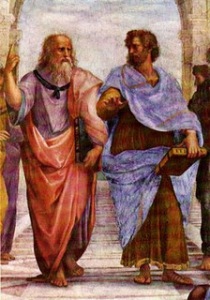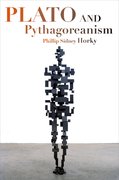What is philosophy (φιλοσοφία)? That is, can we give an essential definition of philosophy? It’s a big question, never explicitly answered by its (possible?) inventor Plato (1). It never seems to go away, either. Still, it was a hot topic in antiquity, especially after Plato and Aristotle’s early and sketchy treatments. Plato dances around a definition of the philosopher in dialogues like the Lysis (212e, 218a-b), Charmides (153d-154a), and Gorgias (482a), but he never defines it explicitly; Aristotle treated it in his dialogues Protrepticus and On Philosophy, now lost but for a handful of fragments (2). Isocrates had something to say about it too, although his definition might not be what today’s philosophers are looking for (3)…
It is difficult to find explicit definitions of philosophy in 4th-Century Greece, even though many associates of Plato and Aristotle wrote treatises or dialogues on the subject, all but lost (4). Maybe later ancient philosophers have something to offer to our search. We’re reading Alcinous’ Didaskalia in the Durham Ancient Philosophy reading group this year. Scholars don’t know precisely who Alcinous was, but he seems to have been a Middle Platonist writing sometime around the 2nd-Century CE. Alcinous seems to be a significant philosopher in his own right, but I’ve been interested in tracing how Middle Platonists such as Alcinous may have begun to synthesize the thought of the great masters Plato and Aristotle.
At the beginning of the Didaskalia (I), Alcinous defines philosophy: it is the ‘striving for wisdom’ (ὄρεξις σοφίας), with wisdom soon defined as ‘a knowledge of divine and human things’ (ἐπιστήμη θείων καὶ ἀνθρωπίνων πραγμάτων). This overall definition of philosophy is similar to that of the Platonist collection of Definitions, which defines it as ‘the striving for the knowledge of the eternal things’ (τῆς τῶν ὄντων ἀεὶ ἐπιστήμης ὄρεξις). When I saw this definition, I first thought about the importance of ‘orexis’ in Aristotle’s philosophy of mind, where it seems to mean something closer to animal ‘intention’ or even physical ‘impulse‘ than what we find in the Platonist writings of Alcinous or the compiler of the Definitions (5).
Perhaps I’m missing the point by looking to Aristotle. I asked myself: to what extent does ‘striving for wisdom’ operate in Plato’s own writings? Indeed, a relatively recent article by David Sedley (6) has shown that the ‘striving to be like’ metaphor occurs in the Phaedo with regard to the famous ‘equal sticks’ passage (74d-75b). There, equal sticks and stones ‘strive’ or ‘desire’ to be like the Form of the Equal, that is, they seek to be maximally like the Form of the Equal. Now, as Sedley argues, such ‘striving’ makes most sense in the case of geometrical objects tending towards certain properties, but ‘striving’ for a property does not seem to be a viable metaphor for other sensible-Form relations in Plato’s metaphysics and epistemology. The case for Plato as the root of Alcinous’ definition of philosophy seems to be growing thin.
And then I had a look at this passage:
‘And of course there’s also this to consider when you’re judging whether a nature is philosophic or not.’
‘What’s that?’
‘If it shares of illiberality (μετέχουσα ἀνελευθερίας), you should not overlook the fact; for pettiness is altogether incompatible with a soul that is always attempting to strive towards everything as a whole, divine and human (τοῦ ὅλου καὶ παντὸς ἀεὶ ἐπορέξεσθαι θείου τε καὶ ἀνθρωπίνου).”
Plato, Resp. VI.486a1-6
This passage follows on the earlier discussion of lover of learning (φιλομαθής), who must strive for truth (πάσης ἀληθείας…ὀρέγεσθαι), which has just been described as what ‘rather much belongs’ (ὀικειότερον) to sophia. Is Socrates trying to suggest that when a soul strives towards things, it is seeking to ‘grasp’ them as it would grasp all objects of knowledge comprehensively, as is implied by Alcinous? I’m not 100% sure about that, but what might be relevant is the idea that the ‘nature’ of a soul couldn’t ‘share in‘ illiberality – note the Form-language – if it strives for ‘everything as a whole’. Perhaps it is right that sensible objects other than the ‘equal sticks and stones’ in Plato’s metaphysics don’t participate in Forms in virtue of striving to be like them, but orexis still remains a live metaphor in other parts of Plato’s metaphysics, at least with regard to ensouled particulars (like human beings). My initial hypothesis that Alcinous’ definition of philosophy was Aristotelian-influenced seems to be wrong…
…yet again, the Republic seems to be the source for the later codification of the Platonists’ doctrines. But that raises another serious question: is it because of its loose, metaphorical language that texts such as the Republic were interpreted so variously by later philosophers? Whatever philosophy is, does it grow in the cracks that we find between Plato’s dialogues, characters, and preliminary definitions?
(1) Philosophia as a term might have a first appearance in extant texts in Plato’s Lysis (213d), but there was a tradition among associates of Plato that it was coined by Pythagoras (cf. Heraclides Pontus F 87-88 Wehrli).
(2) Aristotle defined philosophy as the ‘acquisition and use of wisdom’ (κτῆσις καὶ χρῆσις σοφίας), if the passage from Iamblichus’ Protrepticus 40.1 is direct quotation of Aristotle’s Protrepticus.
(3) On Isocrates’ view of philosophia and its relation to Plato’s view, see A.W. Nightingale, Genres in Dialogue: Plato and the Construct of Philosophy (Cambridge, 1995), Ch. 1.
(4) The Early Academicians Xenocrates and Speusippus each wrote one book On Philosophy; among Peripatetics, we hear about an On Philosophy or On the Royal Philosophy by Strato of Lampsacus as well as, some centuries later, ten books On Philosophy by Aristocles of Messene.
(5) See, inter alia, A. Preus, ‘Intention and Impulse in Aristotle and the Stoics’, in Apeiron 15.1 (June, 1981), pp. 48-58.
(6) D. Sedley, ‘Form-Particular Resemblance in Plato’s Phaedo‘, in Proceedings of the Aristotelian Society 106.1 (June, 2006), pp. 311-327.



